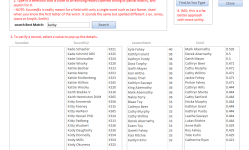I have a situation where a number of entries have been mis-spelled and I need to find the correct spelling in a reference list.
As an example, the mis-spelled word is "Dryopteriaceae" and the correct spelling is "Dryopteridaceae".
My idea is to start with the full word and work backwards until a match is found using the code below.
This code fails with "nLen" not being recognised in the "(left(family, nLen))" statement, with or without the outer ().
Is there a way to progressively limit the recordset field such that the search criteria would eventually find a match.
In this case, when both arguments are "Dryopteri" one could reasonably assume the correct match has been found.
I have seen a reference to using "Soundex" for this purpose but even extending it out to 8 characters, it fails to find a matching pair.
At the requisite four characters, it will find numerous faulty matches as it is only sampling the beginning of each word.
Is this possible, or is there a better way to achieve my goal?
As an example, the mis-spelled word is "Dryopteriaceae" and the correct spelling is "Dryopteridaceae".
My idea is to start with the full word and work backwards until a match is found using the code below.
This code fails with "nLen" not being recognised in the "(left(family, nLen))" statement, with or without the outer ().
Is there a way to progressively limit the recordset field such that the search criteria would eventually find a match.
In this case, when both arguments are "Dryopteri" one could reasonably assume the correct match has been found.
I have seen a reference to using "Soundex" for this purpose but even extending it out to 8 characters, it fails to find a matching pair.
At the requisite four characters, it will find numerous faulty matches as it is only sampling the beginning of each word.
Is this possible, or is there a better way to achieve my goal?
Code:
Private Sub Form_Load()
Dim nLen As integer
Dim str As String
Dim rs1 As Recordset
Set rs1 = oDB.OpenRecordset("taxon", dbOpenSnapshot)
str = "Dryopteriaceae"
nLen = Len(str)
Do
rs1.FindFirst "(left(family, nLen)) ='" & Left(str, nLen) & "'"
If Not rs1.NoMatch Then
Exit Sub
Else
nLen = nLen - 1
End If
Loop While nLen > 1
End Sub
